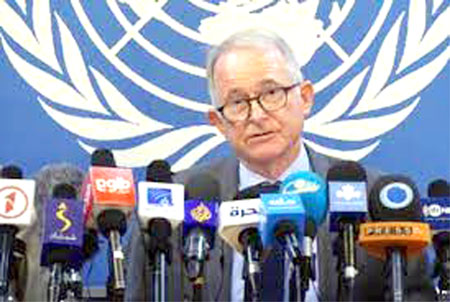The UN Special Rapporteur on the situation of human rights in Afghanistan, Richard Bennett, said that Afghanistan is facing a “plethora of critical human rights challenges that are having a severe impact on the population.”
Bennett appeared on Thursday at a press conference in Kabul, where he shared the findings of his 11-day visit in the country.
Bennett called on the current Afghan officials to acknowledge the “human rights challenges” and to close the gaps “between their words and their deeds.”
Bennett also said that the “de facto authorities have failed to acknowledge the magnitude and gravity of the abuses being committed – many of them in their name.”
The UN Security Council appointed Bennett as special rapporteur on the situation of human rights in Afghanistan earlier this month.
“The Taliban stands at a crossroads. Either the society will become more stable and a place where every Afghan enjoys freedom and human rights, or it will become increasingly restrictive,” Bennett said. “If benchmarks are met such, as the urgent opening of secondary schools for girls, the establishment of an inclusive administration that genuinely represents every segment of the Afghan society, and a platform is provided for dialogue and avenues for redressing grievances, the risks of further instability and suffering in Afghanistan may be mitigated.”
He expressed concern over the humanitarian and economic crisis and urged the international community to continue providing humanitarian assistance for Afghanistan.
The UN rapporteur also said that the armed hostilities in many parts of the country had ceased and there was a consequent reduction in conflict-related casualties since the Taliban takeover.
He underscored that the establishment of a commission for the return of Afghan politicians may provide opportunities for dialogue and potentially strengthen governance.
The associate women’s rights director at Human Rights Watch, Heather Barr called for UN High Commissioner for Refugees, Filippo Grandi, who is visiting Afghanistan, to push the Islamic Emirate to lift restrictions on people’s travel, especially women leaving the country.
“It is urgent for the high commissioner to clarify with the Taliban that anyone has the right to leave the country and it is also important for the high commissioner to speak with countries around the world which are not adequately recognizing the right that all Afghans have to seek asylum if they are experiencing persecution in their country of origin,” told Heather Barr.
“Imposing restrictions on women has created serious employment challenges for women, many of the women are the only breadwinners in their families,” said Munisa Mubarez, women’s rights activist.
Filippo Grandi, the United Nations High Commissioner for Refugees (UNHCR), along with a delegation on Monday, arrived in Kabul to assess Afghanistan’s humanitarian situation and also to meet with Islamic Emirate officials over important issues.
The UN Commissioner on Tuesday met with Abdullah Abdullah, former chairman of the HCNR, and Abdullah said in a tweet that he reiterated his call for further humanitarian support for the people inside Afghanistan.
“During the last war … mostly women were hurt, so they need now to be the center of attention,” said Mawlooda Tawana, a human rights activist.
During the recent seven months since the Islamic Emirate took power in Afghanistan, several United Nations officials arrived in the country to discuss Afghanistan’s issues with new officials.
“We welcome the visits of UN officials, these kinds of meetings and visits are important for more engagement with the current government,” said Bilal Karimi, deputy spokesman of the Islamic Emirate.
Filippo Grande, at the beginning of his visit to Kabul, told reporters that he will meet with Islamic Emirate officials to discuss the humanitarian situation in the country. “They agree very much that we must look at what are the solutions for the people who are refugees or displaced,” he said.—Agencies










